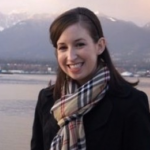Mom, You’re Hired! As My Cancer Caregiver Extraordinaire
February 7, 2014
By: Amanda Nixon
With November being National Family Caregiver Month, I am immediately reminded and in gratitude for all that my mom did to take care of me during my breast cancer diagnosis and treatment.
My mom was never like the other moms. A single, multitasking, fitness buff with fiery red hair, she gave hugs and smiles freely and would talk to anyone. She mastered many professions and wore many hats. As someone who already had a lot on her plate, I felt sorry for my mom when I was diagnosed with breast cancer.
I remember calling her just after receiving the news. I was an independent 27-year-old, but I could barely say the words through the tears. Her strength came across the telephone line immediately: “You will be just fine.” The next day she arrived on my doorstep, ready to do whatever was necessary.
From that day forward, it was “My Mom and Me” vs. Breast Cancer. She took me to every scan, test, and appointment, notebook in hand. She meant business. “We are going to beat this thing.” We immersed ourselves in a foreign language of medical terminology, because on Jan.10, 2006, fighting cancer had become our full-time job.
Like any job, there are tasks you look forward to doing and others you just have to do. As caregiver, there was no handbook, and there were no annual reviews, raises or praises for my mom – just the hope that one day our lives would return to normal. She simply trusted her intuition and did so many things right. Some of her most noteworthy responsibilities on the job.
1. Director of Secretarial Services
Graduating from Post-it notes to a formal cancer journal, my mom would list important questions before every doctor’s visit, and document every answer. Anything I was too embarrassed to ask male doctors, she would ask for me. My mom became my health advocate – researching medications, their side effects, and possible natural alternatives, and completing and filing all paperwork. Still, the best part of her cancer journal was trying to decipher some of her crazy shorthand and laughing for hours on end.
2. Activities Coordinator
My mom and I are BFFs! Yes, high school was bumpy, but for the larger part of my life, we’ve been inseparable. Before cancer became our profession, we enjoyed weekends full of crafting, traveling, shopping, and sampling ethnic restaurants. Once I started chemo, my brain fuzzed over and my zest for these things disappeared. So she came up with other creative ways to entertain me on our (very limited) non-appointment days. We took long walks, explored zoos, gardens and parks, and went to local county fairs and beaches. After each treatment milestone, we would celebrate. Our trip to Yosemite was a major highlight and a great call on her part. I felt safe, and almost normal, with my mom.
3. Estate and Funeral Planner
I’ll never forget the look on my mom’s face when I handed her the envelope with “Will” written on the front of it. She looked like the wind had been knocked out of her. I made some joke, we laughed, and she stuffed it away in her purse. Completing my will and funeral arrangements forced me to accept my own mortality. Despite all the sugar coating, the breast cancer statistics didn’t lie: There was a 40 percent chance of living five years and 30 percent of living 10 years. Regardless of how heartbreaking it was for my mom, I appreciated her willingness to let me process my diagnosis in this manner and help me with the painful details.
4. Personal Chef
Although her carob cupcakes embarrassed me in elementary school, her creative cooking saved the day when I was in treatment. One particular chemotherapy cocktail made me feel sick all the time. Everything tasted of metal, and every aroma made me want to throw up.
My mom would walk to the grocery store a few miles from my house every morning to buy fresh local produce. She experimented with a lot of root vegetables and found bland but healthy items to keep me happy. I loved having her buzz around my little kitchen, and her homemade fare helped me maintain a healthy body weight during a year of chemo.
5. Domestic Goddess
My mom handled the gross stuff – the true show of unconditional love. She “milked” my surgical drains, bathed me, and scrubbed my toilet. She shaved my head, cared for my lips when they puffed up like a blowfish due to some pharmaceutical reaction, and watched me throw up in my bed and hallway when I was too weak to make it to the bathroom. And she never complained.
During chemotherapy I developed a supersensitive nose. I could smell perfume, coffee or fragrant soaps from another room, and it would sicken me. My reaction to cleaners made cleaning a challenge. Still, over several weeks of trial and error, my mom found – or created herself – all the right products to appease my sensitive state and compromised immune system, allowing me to see friends and loved ones.
6. Private Chauffeur
From the first IV, chemotherapy affected my brain. I felt confused and cloudy. My handwriting resembled that of a fourth grader (at best) and even simple tasks were a challenge. I knew I couldn’t drive. My mom couldn’t fix this problem, but she would drive me to my office to let me “work” for a few hours so I could feel needed and normal. She never questioned this and treated me with full respect.
My mom did not complain once throughout her entire tenure as My Cancer Caregiver Extraordinaire. She never wavered. She never let me see her cry and she never let me know that she was afraid too. I know she would have traded places with me in an instant. I don’t think I could have persevered without her to guide me forward. She was the perfect pillar of strength. Six years have passed since my diagnosis, and we still speak every day.
I now work for The Keep A Breast Foundation and have the opportunity to care for young women who are not as fortunate as I was. I have learned the importance of a phone call, a smile, a ride, a hug, a meal, a walk. These small gestures make a huge difference to someone who has been diagnosed with cancer. If you have the same opportunity to act as a caregiver, believe me, your actions will have a huge impact on that person’s health, wellbeing, and ultimately, chances of survival.





